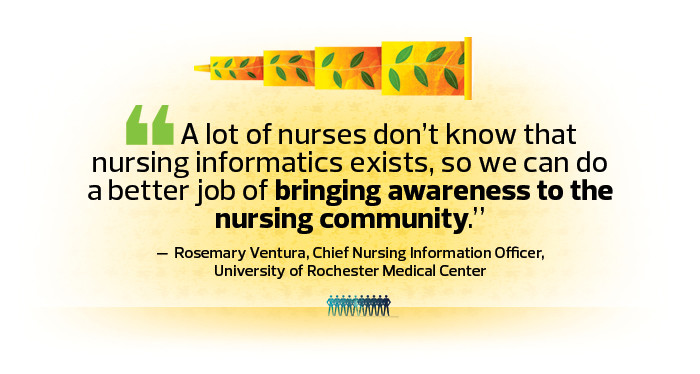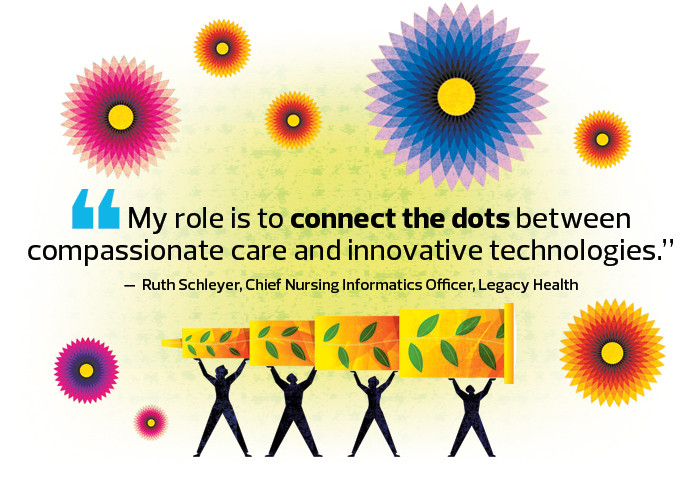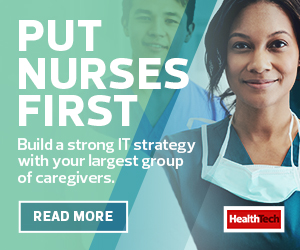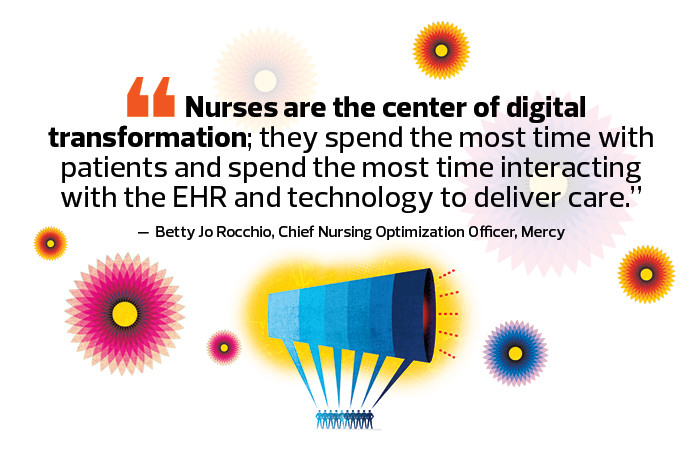Editor’s note: This content series, featured in your Insider dashboard, will be rolled out over the coming weeks to offer advice on driving collaboration between IT teams and clinical staff. (If you’re not already an Insider, sign up for free here.) The associated articles explore why nurses should be included in the decision-making process for purchasing new equipment and how to develop this relationship as part of your IT strategy.
More nurses are joining the growing field of nursing informatics in an executive role, merging their bedside skills with technical strategy to help drive healthcare IT initiatives.
The role — often called the chief nursing informatics officer, or CNIO — provides nurses a voice in the decision-making process as healthcare systems embrace new technology and data analytics to improve patient care and outcomes.
And their core job duties, including cross-departmental strategy and evidence-based technology implementation, are even more crucial during the COVID-19 pandemic.
HealthTech spoke with three executives on their evolving roles, challenges and advice for entering the profession: Betty Jo Rocchio, chief nursing optimization officer at Mercy; Ruth Schleyer, CNIO at Legacy Health; and Rosemary Ventura, CNIO at the University of Rochester Medical Center.
HEALTHTECH: What does your job entail?
ROCCHIO: The position requires a nurse leader to understand how to use technology and analytics to improve performance, care, patient experience and nurse engagement.
It is a partnership. The job requires you to not only work with your IT department but to learn what they do, how they do it and form relationships so we each understand what the other is trying to accomplish.
SCHLEYER: My role is to connect the dots between compassionate care and innovative technologies.
We are always looking at how to provide technology and tools that nurses and interprofessional teams need to deliver the highest-quality evidence-based care possible in a dynamic environment that supports patient safety and outcomes.
VENTURA: I’m responsible for driving a standardized strategy. There may be nursing informaticists at our individual hospitals, but I’m working on a structure that supports enterprise-level standardization.
A lot of my efforts also focus on cleanup work on clinical documentation and making it easier for nurses. Now that we’ve had an EMR for about 10 years, how can we make it better?
HEALTHTECH: To what extent are nurses involved in health IT purchases and deployment?
SCHLEYER: That’s one of the reasons the role exists: to make sure frontline nurses’ voices and their needs are represented. It is a key part of what I strive to do every day.
Still, it’s challenging. Bedside nurses are busy taking care of patients, and governance council attendance is limited; we have to get creative and reach out virtually and asynchronously to gather requirements and feedback.
ROCCHIO: Mercy nurses are actively involved in EHR optimization, IT purchases and implementation. When you look at the literature, it clearly defines that best practice and implementation science requires nurses to be involved with technology design, selection and workflow process design.
VENTURA: We are fortunate because we are “magnet” designated. As part of that, the clinical staff, from bedside nurses to nurse leadership, participate in evaluations. Their voices are always heard.
HEALTHTECH: How important are nurses to digital transformation? How does a CNIO amplify their voices?
ROCCHIO: Nurses are the center of digital transformation; they spend the most time with patients and spend the most time interacting with the EHR and technology to deliver care.
The CNIO has the ability to influence the direction of healthcare by understanding and setting the roadmap for nursing’s contribution to digital transformation.
MORE FROM HEALTHTECH: Learn why IT teams shouldn't make decisions without nurses at the table.
VENTURA: I’m biased: I’m going to say nurses are the most critical. One recent example is the impact of the COVID-19 pandemic. You may have seen stories about how hospitals used technology to connect patients and relatives because they couldn’t visit. Our nurses were at the bedside holding the iPads.
We quickly deployed iPads to inpatient units when we recognized it was mission-critical to make sure patients could connect to their relatives. It was the nurses that were there saying, “I need these iPads to connect families.” Nursing is always at the forefront because we are always at the bedside with patients.
VENTURA: I would love to make strides in bringing mobility to improve clinical communications. We are also talking about capacity management and patient flow and focusing on how we utilize our beds, how we manage the process of getting patients out quickly and safely.
HEALTHTECH: What advances in technology still need to be made?
VENTURA: It’s thinking about how we can change our processes to deliver healthcare more efficiently — cutting out redundancies and leveraging the computer to do decision support, and maybe AI can drive some of that.
ROCCHIO: In our quest for the digital experience, we often add in disparate technologies that don’t talk to each other or integrate well for the patient’s experience. They are not connected in ways that promote optimized workflows for clinicians and nurses.
We have to decide what makes that integration possible. In order to do this, you need a healthcare engineer with a nursing background. If you don’t have a CNIO or chief information optimization officer, you risk making the wrong choice, because integration into automated systems can be problematic.
I road test everything with nurses and workflows. I never let the technology people run wild, and I never let the nurses struggle to solve their own problems. Connecting technology and clinical expertise from the front lines has been most successful. That’s my role.
HEALTHTECH: What are you working on now?
ROCCHIO: I have three big projects. The first is voice-activated charting and integration with Epic Rover. This allows the nurse to interact with the EHR through a hospital-issued secure smartphone.
The second project is a nursing dashboard for managing nursing labor. We’re automating staffing grids, productivity and average hourly rate information to help our managers make real-time staffing decisions. We are building this on the Microsoft Power BI platform.
The third is automating an inventory management system in the operating room to decrease nurse workload and improve productivity metrics.
SCHLEYER: We’ve put multiple projects on pause due to COVID-19 and need to re-examine our next steps.
Prior to that, one of my focus areas was exploring tools to support our very mobile clinical workforce in the acute care setting. We had planned a proof-of-concept project to put smartphones in the clinicians’ hands that would integrate multiple products.
HEALTHTECH: What’s your advice for nurses who want to become CNIOs?
VENTURA: A lot of nurses don’t know that nursing informatics exists, so we can do a better job of bringing awareness to the nursing community.
Look for resources available within your organization or your school. Find a mentor. I don’t mind clinical nurses reaching out to ask, “What is a CNIO?” My job is to keep my door open and to be accessible.
ROCCHIO: The first thing is to get interested in data and analytics and lead with that. Spend as much time as possible interacting with technology leaders and leaders in data science in healthcare. Leading with data and supporting practice with technology will be necessary to provide the best care for your patients.
SCHLEYER: Don’t give up on your dream. Explore advanced education, look for opportunities to get involved in informatics projects and consider entry-level informatics jobs. Have informational interviews with people who work in informatics roles.
In my experience, the people who do this work are passionate and happy to spend the time, so don’t hesitate to ask. Stay curious and keep learning.














